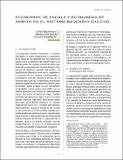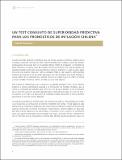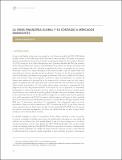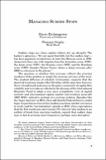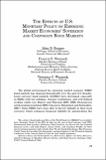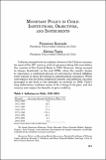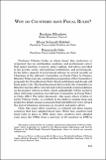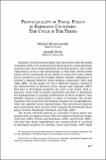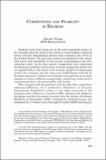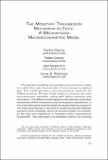Buscar
Mostrando ítems 31-40 de 83
Economías de escala y economías de ámbito en el sistema bancario Chileno
En este estudio se estima una función de costos para el sistema bancario Chileno con una muestra que incluye todas las instituciones financieras que operaron durante el período 1989-2000. Se encuentra evidencia a favor de la existencia de economías de escala en bancos de tamaño pequeño, no así para ...
Un test conjunto de superioridad predictiva para los pronósticos de inflación Chilena
Habitualmente se construyen pronósticos de inflación en distintos momentos del tiempo y a base de conjuntos de información diferentes. Cabría esperar que un pronóstico construido sobre la base de un conjunto de información mayor, fuese más preciso que otro construido a base de un conjunto de información ...
La crisis financiera global y contagio a mercados emergentes
Estudiamos el efecto de los vínculos entre bancos en el contagio de los ciclos productivos con un enfoque específico en la propagación de la crisis de 2007-2009 desde los países avanzados hacia los emergentes. En una muestra de pares de países compuesta de 17 economías avanzadas y 11 emergentes entre ...
Managing sudden stops
Sudden stops are when capital inflows dry up abruptly. The banker’s aphorism—'It’s not speed that kills but the sudden stop'— has been popularly invoked since at least the Mexican crisis in 1994. Awareness then rose with impetus from the Argentine crisis (1995) the Asian crisis (1997) the Russian ...
The effects of U.S. monetary policy on emerging market economies’ sovereign and corporate bond markets
The global environment for emerging market economy (EME) bond markets has changed dramatically over the past few decades. Local currency bond markets (LCBMs) have developed especially in EMEs with low inflation stronger institutions and well defined creditor rights (see Burger and Warnock 2003 2006 ...
Monetary policy in Chile: institutions objectives and instruments
Inflation seemed to be an endemic disease of the Chilean economy for most of the 20th century with its presence being felt even before the creation of the Central Bank in 1925. However things seemed to change drastically in the mid 1990s when the country began to experience a sustained process of ...
Why do countries have fiscal rules?
Professor Vittorio Corbo in whose honor this conference is organized has an outstanding academic and professional career that spans teaching research policy making and advice provided to the private sector international institutions and governments. In the latter capacity of government advisor he ...
Procyclicality of fiscal policy in emerging countries: the cycle is the trend
Economic research on fiscal policy has shown that while developed economies tend to run countercyclical fiscal policies Latin American countries have been characterized by procyclical policies. One of the explanations given to this phenomenon is that high external debt causes severe constraints on the ...
Competition and stability in banking
Banking went from being one of the most regulated sectors in the economy after the crisis in the 1930s to a more lightly regulated sector with the liberalization process that started in the 1970s in the United States. The previous period was marked by few crises with much more instability in the second ...
The monetary transmission mechanism in Chile: a medium-sized macroeconometric model
The objective in building and specifying macroeconomic models is to reflect the main characteristics of an economy in a stylized way. This article describes a macroeconometric model for the Chilean economy. The aim of the model is to forecast the main macroeconomic variables, along with policy exercises ...

